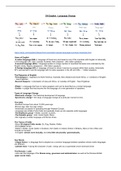CN English - Language Change
https://study.com/academy/lesson/how-colonialism-spread-languages-summary-examples.html
Users of English
-A native language (ENL) = language of those born and raised in one of the countries with English is historically
a first language (UK, USA, Canada, Australia, New Zealand) - 350 million speakers.
-A second language (ESL) = language spoken in a large number of countries that were once colonised by the
English (India, Nigeria, Singapore) - 350 million speakers.
-A foreign language (EFL) = language of those for whom it serves no purpose within their country, historically
EFL was learned to use the language with its native speakers in the UK and USA - 1 billion speakers.
The Diasporas of English
-First diaspora = migrations to North America, Australia, New Zealand and South Africa. L1 variations of English
- ‘new Englishes’.
-Second diaspora = colonisation of Asia and Africa. L2 varieties of English - ‘New Englishes’.
-Pidgin = a language that has no native speakers and can be described as a contact language.
-Creole = a pidgin that has become the first language of a new generation of speakers.
Types of Language Change
-Diachronic change = the historical development of language.
-Synchronic change = the study of language change at a particular moment in time.
The Celts
-Southern Europe from about 12,000 years ago.
-Bronze Age, later Iron Age culture.
-Immensely successful in spreading through Western Europe.
-Language was initially Proto-Celtic and gradually broke up into separate celtic languages.
-The Brythonic group = Welsh, Cornish, Cumbric.
-The Goidelic group = Irish, Scots Gaelic, Manx.
-Not originally a written language until Roman times.
The Traces of Celtic
-About 30 original Celtic words. Ex. Rug, Rasher, Rafter.
-Some place names.
-Welsh in Wales, Scots Gaelic in Scotland, Irish Gaelic in Ireland, Breton in Brittany, Manx in Isle of Man and
Cornish is Cornwall.
-In English: almost none lexically, and very little structurally / grammatically.
Key Words
-Lingua franca = a language that is adopted as a common language between speakers whose natvie languages
are different.
-Latinate lexis = having the character of Latin. Using Latin as a superstrate (more dominant) level.
The Romans - Latin
-Latin was the language of the Roman army, governors and administrators as well as the Romano-British
upper social class.
, -The Celtic continued as the language of the majority in parallel with Latin.
-Permanent occupation began with the conquest in 43 AD. introduction of Latin to Britain.
-The last Roman forces left Britain in the year 410 AD. The south and east coast of Britain were already
suffering from raids by Germanic invaders.
The Traces of Latin
-Directly, they are very few: Latin and Celtic have existed in parallel, not blending.
-The use of the Latin alphabet.
-Indirectly, the influence is enormous: the Roman Occupation brought Britain into the Latin-using world and
Latin became the language of the court, law, medice, sciences, administration etc.
-Specialised Latin vocabulary over the centuries was reincorporated into English as it evolved.
-Latin-derived words are about 29% of the modern English range of vocabulary in the dictionary.
-Probably the terminal -s in plurals.
-Tends to be words that we use less often.
-Left behind a Romanise people who could speak Celtic and Latin.
The Anglo-Saxons - Germanic
-The invaders spoke various dialects of West Germanic.
-Occupied the east and south - other areas remained Celtic.
-Disparate tribes of Angles, Saxons, Jutes, Frisians, driven by pressure on land, raided the coasts of the
south and east England from the late fourth and early fifth century AD.
-After the withdrawal of the Roman army the raids turned into settlement by conquest.
-Romano-British Celtic war-lords fought an unsuccessful rearguard action.
-The Celtic population, meanwhile, emigrated to the Celtic fringe - Scotland, Wales and Ireland or further
afield, establishing Celtic settlement in America (Brittany) where the Breton celtic language developed.
-Other Celts migrated to northern Spain.
-As the tribes merged into larger kingdoms and eventually one, the various dialects also merged into a standard
form - Old English or Anglo-Saxon English.
The Persistence of Latin
-Despite the dominance of Anglo-Saxon, Latin remained in use for various official purposes, all the more so
after Pagan Anglo-Saxons were Christianised in the sixth century.
-Some Latin words had already been adopted by the Germanic tribes even before they came to Britain: cook,
fork, kitchen, noon, street.
The Germanic Language
-Anglo-Saxon was used for writing England’s first history and for the first poem.
-Germanic makes up about 26% of the dictionary vocabulary items of modern English language but far more
than that percentage of actual spoken or written language.
-More commonly used words (percentage of: first hundred 9%, first thousand 57%, second thousand 39%).
The Vikings - Norse
-The language of the Vikings of the period of invasion (800 AD - 1000 AD) forming old Norse.
-Contribution is limited to the English Language.
-Under pressure for land, raiders from Scandinavia (chiefly Norway and Denmark) attacked the east and south
coasts of Scotland and the Islands and the coasts of Ireland from the late 8th century.
-As had been the case with the Anglo-Saxon invaders, raiding turned increasingly to settlement by conquest
and by the mid 9th century a Viking kingdom had been established in the north.
Traces of Norse
-Norse has left behind a very large number of place names.
-There are only about 300 Norse-derived words in modern English (Ex. shirt, skirt, window, take).
The Normans - Norman French
-Duke William of Normandy had a claim to the English throne when it felt vacant in 1066. The Normans invaded
and defeated the Anglo-Saxons in battle.
-Ownership of land moved from the English nobility to the Norman invaders, creating a small ruling class of
Normans controlling a majority of Anglo-Saxons.




